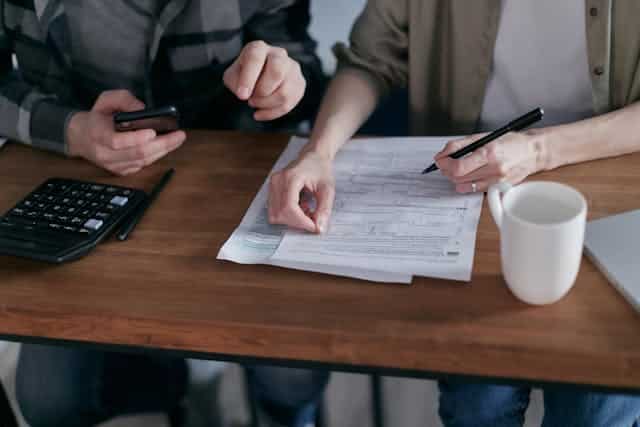Unpaid invoices are one of the biggest enemies of a business. They block the cash flow like a clog in a drain, preventing operations from functioning efficiently and consistently. But for every problem, there is a solution. One of the ways around this problem is to sell unpaid invoices to a third-party company.
In this article, we’ll discuss how you can sell your unpaid invoices for cash and what its benefits are. Let’s have a look.
Compare Invoice Financing Quotes Today
Who to sell unpaid invoices to?
When looking to sell unpaid invoices, it’s important to partner with the right organisation that aligns with your business needs. Below are a few types of them that specialise in purchasing invoices.
1. Factoring companies
Factoring companies at a discount, providing immediate cash flow to your business. They take on the responsibility of collecting payments from your customers. Typically, they advance around 70-90% of the invoice value upfront and the rest after the total payment has been made by your customers minus their factoring fee.
2. Invoice discounting firms
A business can borrow money against its outstanding invoices through these firms as a short-term borrowing option. Unlike factoring, the business retains control over its sales ledger and remains responsible for collecting payments from customers. The firm provides a percentage of the invoice value in advance, with the remaining balance (minus fees) released once all the customers pay.
3. Online invoice marketplaces
The businesses can sell their invoices to investors on these marketplaces. The process is often quick, and it allows businesses to access cash flow without taking an additional debt.
Process of selling invoices for cash

Step 1: Identify the invoices to sell
Select the unpaid invoices you want to sell. Typically, these should be from customers with good credit histories to attract better offers from the factoring company (the practice of selling selected invoices is called spot factoring). You can also sell all of your invoices.
Step 2: Choose a buyer
Decide whether to approach a factoring company, an invoice discounting firm, or any other financial institution. Look closely into their fee structure and the level of services they provide. This will help you choose the best provider.
Step 3: Submit invoices for review
Submit your invoices to your chosen buyer. The buyer will evaluate your customers’ creditworthiness and analyse how likely they are to pay the funds on time.
Step 4: Receive an offer
After this review, the buyer will make you an offer. This usually includes a percentage of the invoice value that will be advanced to you and the fees associated with it.
Step 5: Collection and final payment
After you receive your advance, the buyer takes over the responsibility of collecting payments from your customers. Once payments are received, the remaining balance is released to you.
How to qualify for selling unpaid invoices
There are no strict rules for being eligible to sell invoices for cash. However, you must adhere to the following if you want a reliable partner in the UK:
- Your business should have a stable credit history. Buyers will evaluate your financial standing to ensure you’re a reliable business.
- The creditworthiness of your customers is crucial. Buyers prefer invoices from customers with a strong payment history, as it reduces the risk of non-payment.
- The invoices should be due within a reasonable timeframe (at least 30 days generally) and not already pledged as collateral.
- Your business should be legally registered in the UK. Compliance with UK financial regulations is required.
- Some buyers may have a minimum or maximum invoice value requirement, so ensure your invoices meet these thresholds.
Benefits of selling your unpaid invoices

Now that you’ve understood the process of selling unpaid invoices for cash flow, let’s shed some light on the benefits of this practice as well.
- Improved cash flow:
Instead of waiting for customers to pay their invoices, you can access funds quickly. This allows you to meet operational expenses, invest in growth opportunities and cover unexpected costs without taking on additional debt.
- Reduces the burden of managing collections:
Factoring companies typically handle the responsibility of collecting payments from your customers, freeing up your time and resources to focus on running and growing your business.
- Doesn’t add to your business debt:
Invoice factoring is not considered a loan, so you’re kept at bay from a business debt. This implies that you can increase liquidity without having an impact on your credit score or balance sheet, which will make it simpler to get other forms of funding.
- Provides financial stability:
Selling unpaid invoices can provide a level of financial stability, as it offers a predictable source of working capital. This stability can enhance your ability to negotiate better terms with suppliers, invest in new projects and maintain a competitive edge in your industry.
Sell Your Unpaid Invoices Easily with ComparedBusiness UK
Selling your unpaid invoices for immediate cash is easy with ComparedBusiness. We provide you with secure invoice factoring & financing services from top providers in the UK. Just submit your requirements in less than 2 minutes and we will match you with them. Get ready to receive immediate payment for your outstanding invoices within 1-3 days.
One efficient approach is invoice factoring, where you sell your unpaid invoices to a factoring company and give them a fee for it. The factoring company advances you most of the invoice value up front and collects payment from the customer itself.
Most of the payment terms are extended from 30 to 90 days although this can vary from one industry to another. This means the customer has a maximum of 90 days to pay the invoices for the goods and services bought from the supplier.
Some of the best ways to collect unpaid invoices are sending consistent payment reminders, offering incentives like discounts for early payments and enforcing late fees. Invoice factoring is another good approach to getting immediate cash from outstanding invoices.
